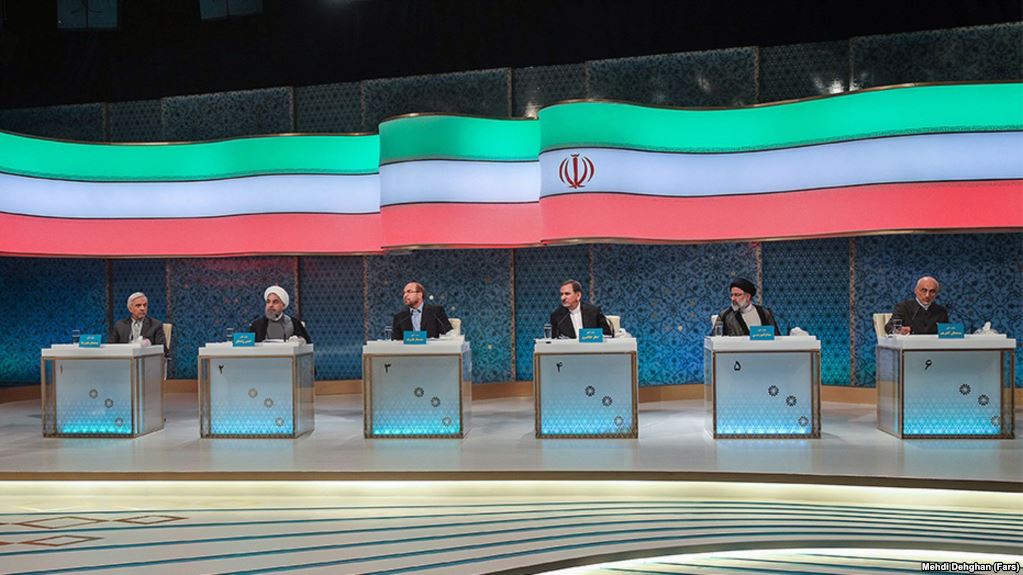As expected, the economy was at the fore of Iran’s first debate for the Presidential election on May 19, with President Hassan Rouhani’s conservative and hardline challengers accusing him of failing to deliver recovery after the July 2015 nuclear agreement with the 5+1 Powers.
The three-hour debate among six candidates on Thursday night was broadcast live on State TV after an appeal by candidates reversed an earlier decision by the Election Commission to only allow a pre-recorded event.
The cleric Ebrahim Raisi, who is likely the preferred candidate of the Supreme Leader’s office, declared:
The gap between rich and poor has widened in Iran…Monthly cash handouts to poor people should be tripled.
One of the main priorities of the Islamic Republic is to preserve social justice….Steps should be taken to protect poor people. We need to overhaul the economic system.
Rouhani responded that the Government’s record of economic success — including a decrease in inflation from more than 40% to less than 9% and growth of 7.4% in the past year amid a 40% rebound in oil exports — had been subjected to “lies and defamation”.
Significantly, the President pressed ahead with his linkage of further economic progress with a foreign policy of engagement with other countries, despite the opposition of the Supreme Leader: “More investment means the creation of more jobs….If we want 8% economic growth, we need foreign investment.”
The Supreme Leader, with his hostility towards the US and its allies, prefers an approach of self-sufficiency through the “Resistance Economy” to Rouhani’s methods of engagement.
The Government’s attempts to rebuild foreign trade and investment, including in key sectors such as energy and transport, has been hindered by ongoing US sanctions. However, it is also being challenged by opposition from other factions, such as the Revolutionary Guards, and the need for reform in finance and banking.
The official rate of unemployment is still rising at more than 12%, though some analysts same the actual level is about 20%. Tehran Mayor Mohammad-Baqer Qalibaf, who has said he will created five million jobs, tried to damage Rouhani with the claim that the President had failed to deliver on his own promise of putting four million Iranians back into work.
A Reformist Twist from the Vice President
The night’s unexpected turn was the performance of Rouhani’s 1st Vice President Eshaq Jahangiri, acclaimed by Iranians on social media as a welcome resurgence for reformists after more than a decade of suppression — including after the disputed 2009 Presidential election — and the ongoing house arrests of the Green Movement’s leaders and blacklisting of former President Mohammad Khatami.
Jahangiri, from the same centrist background as the President, appeared to be standing as a fallback if Rouhani’s prospects were damaged by the conservative and hardline challengers. However, in the debate, he moved to fill the vacuum from the regime’s attempts to break reformist politics:
You’ve deprived a movement — the reformists — of all their rights. You don’t even want them to have a representative in the elections. I’ve come as the candidate of the reformists, to use all the opportunities to highlight what some have done to them.
جهانگیری: شما یک جریان ریشهدار به نام اصلاحطلب از همه حقوق محروم کردید و میگوید یک کاندید هم نداتشه باشند؟ نماینده جریان اصلاحطلبم. pic.twitter.com/XLqmqRDBOJ
— روزنامه ایران (@IranNewspaper) April 28, 2017
Jahangiri clashed frequently with Tehran Mayor Qalibaf, who had accused the Vice President of being a “cover candidate” for Rouhani and said the two man only represent the “4%” of Iranian politics.

